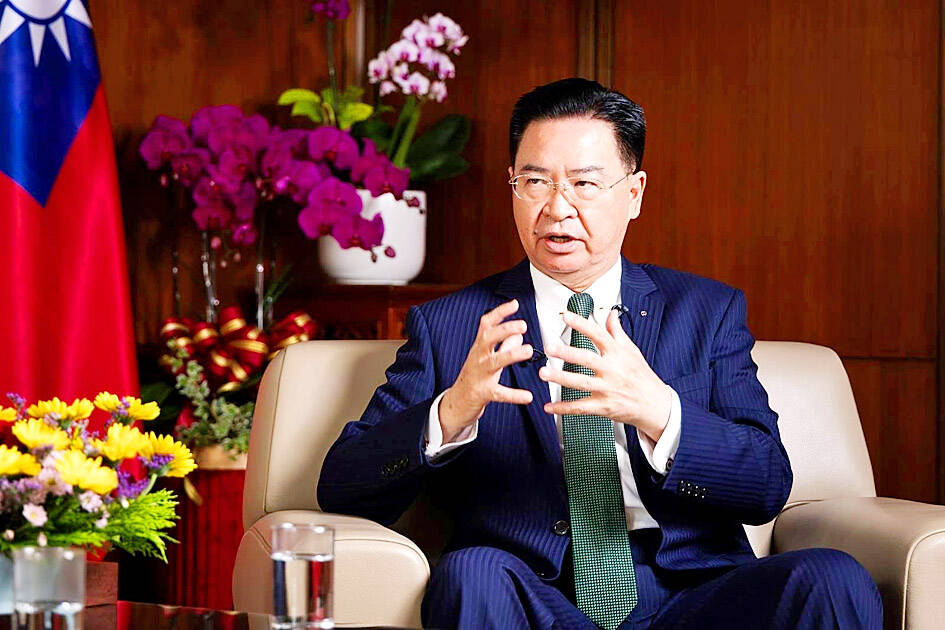The government is documenting its experiences with China’s alleged attempts to interfere in elections next week and is to publish its analysis soon after the vote, Minister of Foreign Affairs Joseph Wu (吳釗燮) said on Wednesday.
The government has pointed to military and economic pressure, as well as Chinese-subsidized trips to China for local Taiwanese officials, as evidence of Beijing’s interference ahead of the presidential and legislative elections on Saturday next week.
China’s Taiwan Affairs Office (TAO) has called the elections “purely an internal Chinese matter” and that the Democratic Progressive Party (DPP) is trying to call any kind of interactions between the two sides of the Taiwan Strait election interference.

Photo courtesy of the Ministry of Foreign Affairs
“The Chinese regime has made no bones about the purpose of its military coercion and trade manipulation. The message is clear: Taiwan’s voters must reject the ruling Democratic Progressive Party ticket of [Vice President William] Lai (賴清德) and Hsiao Bi-khim (蕭美琴), or else,” Wu wrote in the latest issue of The Economist. “The bluntness of the language shows that the government in Beijing is not afraid of being seen as a player in Taiwan’s national elections.”
Beijing is attempting to convince a minority of swing voters by “taking advantage of Taiwan’s openness,” flooding voters with disinformation and inviting grassroots officials on China tours, he wrote.
“In a tight race like this one, and with the concerted effort the PRC [People’s Republic of China] is making, it might just get its way,” he wrote.
However, Wu said that Taiwan is taking measures to counter this interference and is documenting its experiences, with analysis to be published shortly after the elections “in consultation with international experts.”
“Should China succeed in shaping the outcome of voting in Taiwan, it will apply the same tactics to other democracies to promote its preferred international order,” Wu wrote. “Democratic countries should never let this happen.”
He urged the international community to pay more attention to China’s efforts to undermine Taiwan’s democracy through influence and disinformation campaigns, as well as hybrid warfare, including cyberattacks — especially as Taiwan’s elections are just one of more than 40 to take place this year.
“Our desire is to turn Taiwan’s experience into a positive contribution to the rules-based international order, thereby helping the free world’s fight against authoritarian powers bent on eroding democratic systems,” Wu wrote. “It is our belief that democracy will prevail.”
Yesterday, the TAO in a statement responding to DPP accusations of election interference said that such attacks were the DPP’s “usual trick” in elections to shift the focus of attention away from the party’s own problems.
“These dirty and lame tricks are used too much, and they will only make themselves become a laughingstock,” it said.
Additional reporting by Kayleigh Madjar

‘CORRECT IDENTIFICATION’: Beginning in May, Taiwanese married to Japanese can register their home country as Taiwan in their spouse’s family record, ‘Nikkei Asia’ said The government yesterday thanked Japan for revising rules that would allow Taiwanese nationals married to Japanese citizens to list their home country as “Taiwan” in the official family record database. At present, Taiwanese have to select “China.” Minister of Foreign Affairs Lin Chia-lung (林佳龍) said the new rule, set to be implemented in May, would now “correctly” identify Taiwanese in Japan and help protect their rights, the Ministry of Foreign Affairs said in a statement. The statement was released after Nikkei Asia reported the new policy earlier yesterday. The name and nationality of a non-Japanese person marrying a Japanese national is added to the

AT RISK: The council reiterated that people should seriously consider the necessity of visiting China, after Beijing passed 22 guidelines to punish ‘die-hard’ separatists The Mainland Affairs Council (MAC) has since Jan. 1 last year received 65 petitions regarding Taiwanese who were interrogated or detained in China, MAC Minister Chiu Chui-cheng (邱垂正) said yesterday. Fifty-two either went missing or had their personal freedoms restricted, with some put in criminal detention, while 13 were interrogated and temporarily detained, he said in a radio interview. On June 21 last year, China announced 22 guidelines to punish “die-hard Taiwanese independence separatists,” allowing Chinese courts to try people in absentia. The guidelines are uncivilized and inhumane, allowing Beijing to seize assets and issue the death penalty, with no regard for potential

‘UNITED FRONT’ FRONTS: Barring contact with Huaqiao and Jinan universities is needed to stop China targeting Taiwanese students, the education minister said Taiwan has blacklisted two Chinese universities from conducting academic exchange programs in the nation after reports that the institutes are arms of Beijing’s United Front Work Department, Minister of Education Cheng Ying-yao (鄭英耀) said in an exclusive interview with the Chinese-language Liberty Times (the Taipei Times’ sister paper) published yesterday. China’s Huaqiao University in Xiamen and Quanzhou, as well as Jinan University in Guangzhou, which have 600 and 1,500 Taiwanese on their rolls respectively, are under direct control of the Chinese government’s political warfare branch, Cheng said, citing reports by national security officials. A comprehensive ban on Taiwanese institutions collaborating or

STILL COMMITTED: The US opposes any forced change to the ‘status quo’ in the Strait, but also does not seek conflict, US Secretary of State Marco Rubio said US President Donald Trump’s administration released US$5.3 billion in previously frozen foreign aid, including US$870 million in security exemptions for programs in Taiwan, a list of exemptions reviewed by Reuters showed. Trump ordered a 90-day pause on foreign aid shortly after taking office on Jan. 20, halting funding for everything from programs that fight starvation and deadly diseases to providing shelters for millions of displaced people across the globe. US Secretary of State Marco Rubio, who has said that all foreign assistance must align with Trump’s “America First” priorities, issued waivers late last month on military aid to Israel and Egypt, the